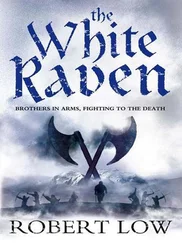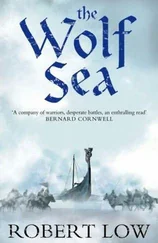Einar nodded. 'We finish Vigfus here, lads. There is no escape for him now.'
We agreed. The words gnawed me, kicked in the thought that had eluded me since the fight on the Rus boat. It crashed on me like a sluice of cold water.
She had planned it with Einar . She had spotted Hogni as one of Vigfus's men and had told Einar and then given him her price for leading him to Attila's silver, for giving up her precious talisman, the spear-shaft.
Vigfus. Who had beaten and raped her and now faced her vengeance.
She had plotted with Hogni, pretending to want away from Einar and all with Einar's knowing. He had tried to trap them on the Rus boat—that's why he had all the men armed and mailed, for he knew there would be a raid. But when Vigfus wasn't part of it, he let them take her, thinking then to trap Vigfus in the town.
That had also failed, which wasn't part of the plan . . . but he had trusted that he knew Hild well enough, that she was leading Vigfus to where he could be finally trapped and slain. All he had to do was follow, to this place.
He had sweated a bit and lost sleep over it but she had kept her part in the bargain.
I sank down then, drained of all feeling. There was cleverness in it and ruthlessness and that was no fault.
But there was also a coldness and something sick and black as rot.
Once, when I was hunting wild honey late in the season and thought I'd found a comb in a tree hollow, I had boldly thrust my hand in, for speed can foil bees made sluggish with cold. I had plunged into stickiness and triumphantly seized a handful and pulled it out—only to find the slick remains of dead bees and old comb, a stinking mess that made me gag.
I knew where this malignant rot came from, too. Einar, I thought, had made a bad bargain, no matter what he believed Hild would do for him now. Whatever Hild was before she was something else now, something . . . Other . . . and something that had a plan all of its own.
She wanted, I was thinking, to get to Atil's howe. Had to. Needed us to help her do it—and what then?
Einar's eyes were too full of silver to see clearly and, worse, he was dragging us all along, I saw with cold despair, in the shackles of our own oath honour.
He and Valknut forced out the huge stone beam that barred the equally heavy stone doors. No one wanted to ask how a slip of a girl like Hild had managed to shut and bar the door on her own.
We started down the stairs, reached a landing which led to the left, then continued to where Vigfus's torches lit the room beyond. Two steps further down, we stopped, amazed, afraid.
The room was lined with men, armoured in cobwebs and rotting leather and rusting metal lappets. They sat, cross-legged, spears upright and butted into round holes in the floor. A few elaborately helmeted heads had toppled, some skeletal hands had slipped from the spears, but Dengizik's faithful sat on, in the same position they had once taken up on the day the tomb was sealed.
The enormity of that stunned me into sitting down on the lowest stair. They had marched in, sat down, butted their spears and died. Poison? Perhaps, though I would not have been surprised to learn that Dengizik's faithful guard had simply stayed sitting until they died of starvation and thirst.
They sat in neat lines flanking a flagged approach running from the stair to where Dengizik sat, equally armoured, on a stone throne, a great cross on one side . . . no, not a cross. Cross-shaped, but from the arm of the T hung hair. Horsetails: the standard of a Hun chieftain, I learned later. A great, ornate helmet was set on the top of it and I realised this was because the withered thing on the throne had no head.
I got to know those standards well, for the Khazars, who would not have been out of place at Attila's side, had them, too, as well as the strange disc-standards that marked them as Jewishmen—but I never again came across a howed-up steppe lord with no head.
Nor were the lines quite as neat now as they must have been for centuries. The tilting stones above opened on both sides and Boleslav had slipped down one on the left, straight on to the grounded spears of the long-dead.
His weight had snapped the old wood; he had crashed into the dusty corpses beyond and rolled out on to the flagged approach. Now he lay at Dengizik's enthroned feet, pierced through chest and belly, finished off with a merciful throat-cut.
All that strength and skill, I marvelled, remembering him spinning the giant Dane axe, laid low by a slip of a girl. And I shivered at what he had done to her to deserve that impaled death. I knew well enough and half the shiver was for me.
Do not love me , she had said.
Vigfus stepped forward, splendid in gilded mail and a marvellous helmet that had been new for his great-grandfather, which covered the whole face save for the mouth and eyes and had gilded eyebrows and two huge raven feathers.
Behind and on either side were his men, desperate-grim and hefting their axes and swords and spears.
There was only one sure way out of that room and that was to go through us and there were not nearly enough of them for that.
Someone flitted past me, back up the stairs and I almost followed, thinking we were well out of it—then I saw it was Bagnose, heading back to the opening, which lay above the room, nocking an arrow as he went.
Steinthor, I presumed, was already there.
Ì suppose,' Vigfus said, scowling, 'there is no bargaining here.'
`None,' replied Einar with a twisted smile.
Òne to one to settle this, winner lets the others go?'
Einar shook his head, chuckling. 'What—and let all this planning go to waste? How does it feel, Quite the Dandy, ladies' man, to have been so trapped by my lady?'
Vigfus narrowed his eyes at the full import of what had been said. His men looked anxiously from one to the other.
Ìf she is your lady,' Vigfus snarled, 'I wish you well of her. You pair are suited. Personally, I found her a poor, cold, dry hump but she seemed to want more, so I let my lads have a go. Most preferred to find a goat.'
Some of his men chuckled. Most, realising that that poor, cold, dry hump was what had led them to this wyrd, were less amused.
Ènough talk,' said Einar coldly and snaked forward. An arrow hissed from the opening above and one of Vigfus's men screeched and plucked at the shaft through both sides of his neck. Men closed, steel crashed, shields whumped under blows.
I was cautious, I ganged up with old Wryneck on one man and, between us, we cut him down in a flurry of blows, me hacking deep scores in his arms and one calf, Wryneck battering lumps off his head and swearing.
Another hurtled out of the darkness at us and I twisted to face him. Pain sprang from my ankle and I grunted and stopped. Wryneck clashed with his man and I barely managed to deflect a blow meant for him.
An axe whirred out of nowhere and clattered off Gunnar Raudi's shield. My opponent, black-bearded, screaming, cut a vicious diagonal slash, which I sprang back from. His momentum carried the blow into one of the dead warriors, who exploded in a great eruption of dust and dead insects and toppled sideways. An arrow from above then smacked Black Beard between the shoulder blades, propelling him straight at me, so that he fell on his face and slid to my feet.
His shield smashed into my injured ankle and I went down, sick with the pain of it, dropping sword and shield to clutch the thing, howling. Wryneck, too busy with his own man, never spared me a glance.
Through the sparkling lights of pain in front of my eyes, I saw Einar cut his man down with a swift series of feints and strikes and vicious shield punches. He turned then, to where Gunnar Raudi was trading blows with Vigfus, who scorned a shield and had a boarding axe in one hand and a long seax in the other.
Читать дальше
Конец ознакомительного отрывка
Купить книгу











